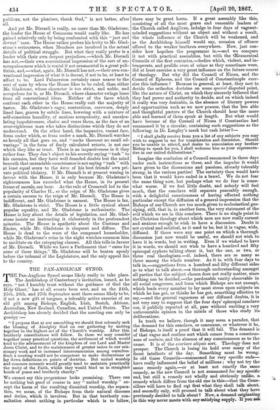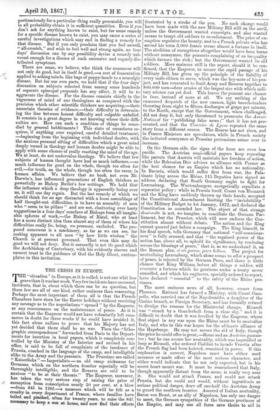THE PAN-ANGLICAN SYNOD.
THE Pan-Anglican Synod seems likely really to take place. The Archbishop of Canterbury's invitation, issued, as he says, " not I humbly trust without the guidance of God the Holy Ghost," has at all events been sent, and on the 24th, 25th, 26th, and 27th September next there seems likely to be, if not a new gift of tongues, a tolerably active exercise of an old gift among Bishops, English, Irish, Scotch, African, Australian, New Zealand, Canadian, and United States. The Archbishop has already decided that the meeting can only be gossipy :- " I propose that at our assembling we should first solemnly seek the blessing of Almighty God on our gathering by uniting together in the highest act of the Church's worship. After this, brotherly consultations will follow. In these we may consider together many practical questions, the settlement of which would tend to the advancement of the kingdom of our Lord and Master Jesus Christ, and to the maintenance of greater union in our mis- sionary work and to increased intercommunion among ourselves. Such a meeting would not be competent to make declarations or lay down definitions on points of doctrine. But united worship and common counsels would greatly tend to maintain practically the unity of the Faith, whilst they would bind us in straighter bonds of peace and brotherly charity."
We cannot say this programme looks promising. There can be nothing but good of course in any " united worship " ex- cept the harm of the resulting disunited worship, the separa- tion, we mean, of the Bishops from their natural dioceses and duties, which it involves. But in that brotherly con- sultation about nothing in particular which is to follow, there may be great harm. If a great assembly like this, consisting of all the most grave and venerable leaders of the Church called Anglican, indulge in four days of vagrant- minded suggestions without an object and without a result, the whole influence of the Church will be weakened, and as the Archbishop himself would say, occasion of offence offered to the weaker brethren everywhere. Now, just con- sider how hopeless the programme is,—and we compare it not with practical assemblies, but with the (Ecumenical. Councils of the first centuries,—bodies which, violent, and in- temperate, and prolific even of crime as they sometimes were, did at least exercise a very great influence on the future course of theology. But why did the Council of Nicaaa, and the Council of Ephesus, and the Council of Constantinople exer- cise this influence ? Because in general, at least, they met to decide the orthodox doctrine on some special disputed point, like the nature of Christ, on which they sincerely believed that they had power and authority to decide, and on which indeed it really was very desirable, in the absence of literary powers and opportunities such as we now possess, that the less able and thoughtful pastors of the Church should hear the more able and learned of them speak at length. But what would have become of the Council of Nicaea if Constantine had summoned it by a circular, containing such suggestions as the- following, in Dr. Longley's meek but rash letter $— " I shall gladly receive from you a list of any subjects you may wish to suggest to me for consideration and discussion. Should you be unable to attend, and desire to commission any brother- Bishop to speak for you, I shall welcome him as your representa- tive in our united deliberations."
Imagine the confusion of a Council summoned in those days under such instructions as these, and the impulse it would have given to the dissensions and passions, already tolerably strong, in the various parties! The certainty then would have- been that it would have ended in a brawl. We do not fear the same thing now, but perhaps what we do fear is some- what worse. If we feel little doubt, and nobody will feel much, that the conclave will separate peaceably enough, with a delightful consciousness of having effected nothing particular except the diffusion of a general impression that the Bishops of our Church are too much given to ecclesiastical gos- siping, still, that is, in another form, the very statement of the evil which we see in this conclave. There is no single point in the Christian theology about which men are now really earnest and anxious enough to wish to have a discussion. Doubt is not cynical and satirical, as it used to be, but it is vague, wide, diffused. If there were any one point on which a thorough discussion just now would be useful, we should not wish to- have it in words, but in writing. Even if we wished to have it in words, we should not wish to have a hundred and fifty episcopal cyphers talking about it, but the one, or two, or three real theologians,—if, indeed, there are as many as three among the whole number. As it is, with four days to talk in,—suggestions from a hundred and fifty different sides as to what to talk about,—a thorough understanding amongst all parties that the subject chosen does not really matter, since nothing can be decided,—the pardonable vanity observable in all social congresses, and from which Bishops are not exempt, which leads every member to lay most stress upon subjects on which he has got, or thinks he has got, something effective to say,—and the general vagueness of our diffused doubts, it is not very easy to suppose that the four days' episcopal conclave can, if publicly reported at all, pass without exciting a very unfavourable opinion in the minds of those who study its. deliberations.
In truth we believe, though it may seem a paradox, that the demand for this conclave, or concourse, or whatever it be,. of Bishops, is itself a proof that it will fail. The demand is of that vague and restless sort which comes from a conscious- ness of malaise, and the absence of any consciousness as to the cause. It is of the exoriare aliquis sort. Theology does not prosper. The Church is losing its hold over many of the. finest intellects of the day. Something must be wrong.. In old times Councils—summoned for very specific ends— have really influenced the belief of millions ; why not try the- same remedy again,—or at least not exactly the same remedy, as the new Council is not summoned for any specific end, but still a remedy not wholly and obviously unlike, a, remedy which differs from the old one in this—that the Coun- cillors will have to find out first what they shall talk about, and secondly only, will proceed to talk about what they have- previously decided to talk about ? Now, a demand originating in this way never meets with any satisfying supply. If you ask pertinaciously for a particular thing really procurable, you will in all probability obtain it in sufficient quantities. Even if you don't ask for anything known to exist, but for some remedy for a specific disease known to exist, you may cause a series of careful investigations which may end in finding a remedy for that disease. But if you only proclaim that you feel unwell, " all-overish," and wish to feel well and strong again, no four days' discussion can by any possibility devise a remedy uni- versal enough for a disease of such extensive and vaguely dis- tributed symptoms.
There are some, we believe, who think the concourse will not only do good, but in itself be good,—a sort of fomentation applied to aching minds, like bags of poppy-heads to a neuralgic disease. But for our own parts, we hold that if the four days' discussion on subjects selected from among some hundreds of separate episcopal proposals has any effect, it will be to aggravate the disease. For the disease consists chiefly in the vagueness of mind of our theologians as compared with the precision which other scientific thinkers are acquiring,—their -uncertain theories of evidence,—their difficulty in determin- ing the line between honest difficulty and culpable unbelief. It consists in a great degree in not knowing where their diffi- culties are. How can such a condition of things be reme- died by general babblements ? This state of uneasiness re- quires, if anything ever required, careful detailed treatment, —beginning from the beginning with individual doubts, with the anxious personal sifting of difficulties which a great mind deeply versed in theology and human doubts might be able to apply with some chance of really reaching the mind of the age. We at least, do not undervalue theology. We believe that few subjects of human thought have had so much influence,—so much influence for good on the whole, though too often for evil,—for truth, on the whole, though too often for error, in human affairs. We believe that no book, not even Mr. Darwin's, has influenced generations of English thinkers so powerfully as Bishop Butler's few writings. We hold that the influence which a deep theology is apparently losing over us, it will one day regain. But the last remedy of which we should think for an age distracted with a loose assemblage of half thought-out difficulties, is to have an assembly of men who " seem to be pillars " and are not, chattering over hasty suggestions in a four days' conclave of Bishops from all imagin- able spheres of work,—the Bishop of Natal, who at least has a more distinct idea than almost any of them of where his difficulties really lie, being, we presume, excluded. The pro- posed concourse is a machinery, as far as we can see, for making apparent to all men " by how little wisdom " the Church is at present governed. That even this may do good we will not deny. But it assuredly is not the good which the Archbishop of Canterbury, with his evidently sincere and earnest trust in the guidance of God the Holy Ghost, contem- plates in this invitation.































 Previous page
Previous page